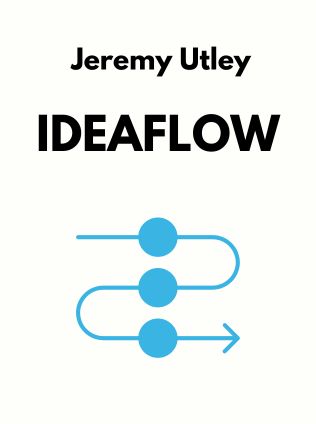
Ideaflow
The Only Business Metric That Matters
By Jeremy Utley,
Published 10/2022
About the Authors
Jeremy Utley and Perry Klebahn are renowned experts in the field of innovation and creativity. Jeremy Utley serves as a lecturer at Stanford University’s d.school and an adjunct professor at the Stanford School of Engineering, where he focuses on teaching creativity and innovation. Perry Klebahn, also a professor at Stanford University’s d.school, has an extensive background in business and product development. Together, they bring a wealth of experience and insights into how creativity can be harnessed to solve problems and drive business success.
Main Idea
The central premise of "Ideaflow: The Only Business Metric that Matters" is that the generation of a large number of ideas, termed ideaflow, is crucial for solving problems and fostering innovation. Utley and Klebahn argue that the quality of solutions is directly proportional to the quantity of ideas produced. They posit that everyone, not just those in traditionally creative fields, needs to cultivate their creativity to achieve significant breakthroughs. Through practical steps and techniques, they aim to equip readers with the tools to enhance their ideaflow and, consequently, their problem-solving abilities.
Table of Contents
- Introduction to Ideaflow
- The Concept of Ideaflow
- Overcoming Creative Barriers
- The Importance of Testing Ideas
- Elevation: Cultivating Diverse Perspectives
- Enhancing Observational Skills
- Generating Effective Questions
- Breaking Creative Blocks
- Practical Applications of Ideaflow
- Conclusion
Introduction to Ideaflow
In the introduction, Utley and Klebahn lay the foundation for the concept of ideaflow. They emphasize that true problems are idea problems, which require a robust generation of ideas to solve. The authors believe that creativity is not an innate talent but a skill that can be developed and mastered. They assert that "Creativity is doing more than the first thing that comes to your mind." This sentiment encourages readers to push beyond initial ideas to uncover truly innovative solutions.
The Concept of Ideaflow
Ideaflow, as defined by Utley and Klebahn, is the measure of how many ideas a group can generate in a given time. They argue that high ideaflow is essential for creativity and innovation. To test and improve one's ideaflow, they suggest exercises like generating numerous subject lines for emails within a set time frame. The goal is to increase the number of ideas over time, thus enhancing creative output.
“The best ideas come after the most obvious ideas have already been given.” - Jeremy Utley
Utley and Klebahn believe that the traditional emphasis on quality over quantity in idea generation is flawed. They argue that by focusing on generating a large volume of ideas, individuals and teams can eventually arrive at high-quality, innovative solutions. This approach encourages experimentation and reduces the fear of failure, which often stifles creativity.
Overcoming Creative Barriers
The authors identify several barriers to creativity, including internal censorship, anchoring bias, and the Einstellung effect. Internal censorship, or self-doubt, inhibits the free flow of ideas. Anchoring bias causes people to cling to the first good idea they hear, while the Einstellung effect limits seeing alternative solutions. To overcome these barriers, Utley and Klebahn advocate for techniques like idea quotas and brainstorming with diverse groups.
Internal censorship is particularly detrimental because it prevents individuals from expressing unconventional or seemingly impractical ideas. Utley and Klebahn suggest setting idea quotas to shift focus from quality to quantity. By doing so, individuals can push past their initial inhibitions and explore a broader range of possibilities.
Some strategies to overcome these barriers include:
Sign up for FREE and get access to 1,400+ books summaries.
You May Also Like
The Subtle Art of Not Giving a F*ck
A Counterintuitive Approach to Living a Good Life
By Mark MansonRich Dad Poor Dad
What the Rich Teach Their Kids About Money - That the Poor and Middle Class Do Not!
By Robert T. KiyosakiHow To Win Friends and Influence People
The All-Time Classic Manual Of People Skills
By Dale CarnegieQuiet: The Power of Introverts
The Power of Introverts in a World That Can't Stop Talking
By Susan Cain



















